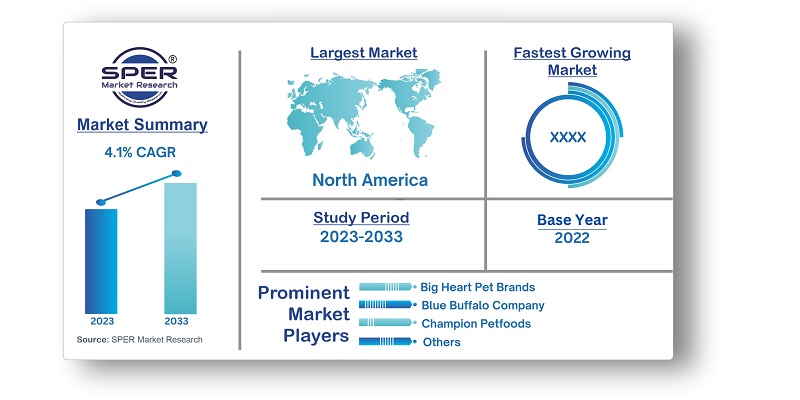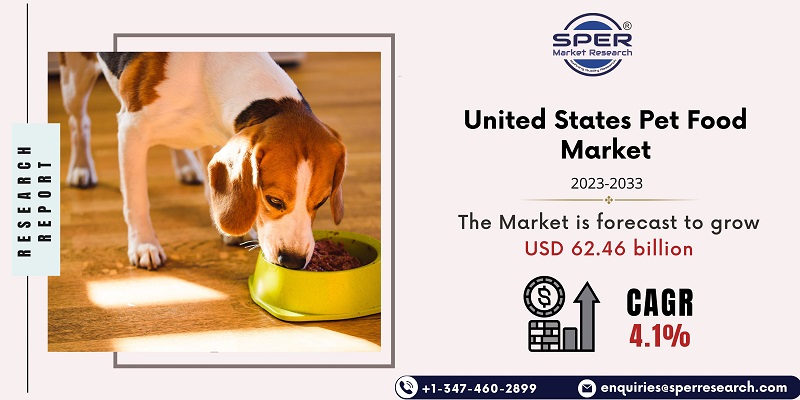
United States Pet Food Market Growth, Size, Trends, Demand, Revenue, Share and Future Outlook
United States Pet Food Market Size- By Pet Type, By Distribution Channel, By Product Type, By Pricing Type, By Ingredient Type- Regional Outlook, Competitive Strategies and Segment Forecast to 2033
| Published: Jan-2024 | Report ID: FOOD2411 | Pages: 1 - 103 | Formats*: |
| Category : Food & Beverages | |||
- July 2023: For pets with sensitive stomachs and skin lines, Hill's Pet Nutrition has developed its new line of MSC (Marine Stewardship Council) certified pollock and insect protein products. They contain vitamins, omega-3 fatty acids, and antioxidants.
- May 2023: New cat snacks under the Friskies "Friskies Playfuls - treats" brand have been introduced by Nestle Purina. For mature cats, these spherical treats come in flavours including chicken and liver as well as salmon and prawns.


| Report Metric | Details |
| Market size available for years | 2019-2033 |
| Base year considered | 2022 |
| Forecast period | 2023-2033 |
| Segments covered | By Pet Type, By Distribution Channel, By Product Type, By Pricing Type, By Ingredient Type |
| Regions covered | Eastern Region, Western Region, Southern Region, Northern Region |
| Companies Covered | Big Heart Pet Brands, Blue Buffalo Company, Champion Petfoods, Diamond Pet Foods, Hill's Pet Nutrition, Mars Petcare Inc., Merrick Pet Care, Nestlé Purina PetCare, Spectrum Brands Holdings, WellPet LLC, Others |
- Pet Breeders
- Pet Food Ingredient Suppliers
- Pet Food Manufacturers
- Pet Food Marketing Agencies
- Pet Food Researchers and Nutritionists
- Pet Owners
- Pet Retailers
- Veterinarians and Pet Healthcare Professionals
- Others
| By Pet Type: |
|
| By Distribution Channel: |
|
| By Product Type: |
|
| By Pricing Type: |
|
| By Ingredient Type: |
|
- United States Pet Food Market Size (FY’2023-FY’2033)
- Overview of United States Pet Food Market
- Segmentation of United States Pet Food Market By Pet Type (Dog Food, Cat Food, Others)
- Segmentation of United States Pet Food Market By Distribution Channel (Online, Specialty Stores, Supermarkets and Hypermarkets, Others)
- Segmentation of United States Pet Food Market By Product Type (Dry Pet Food, Snacks and Treats, Wet and Canned Pet Food)
- Segmentation of United States Pet Food Market By Pricing Type (Mass Products, Premium Products)
- Segmentation of United States Pet Food Market By Ingredient Type (Animal Derived, Plant Derived)
- Statistical Snap of United States Pet Food Market
- Expansion Analysis of United States Pet Food Market
- Problems and Obstacles in United States Pet Food Market
- Competitive Landscape in the United States Pet Food Market
- Impact of COVID-19 and Demonetization on United States Pet Food Market
- Details on Current Investment in United States Pet Food Market
- Competitive Analysis of United States Pet Food Market
- Prominent Players in the United States Pet Food Market
- SWOT Analysis of United States Pet Food Market
- United States Pet Food Market Future Outlook and Projections (FY’2023-FY’2033)
- Recommendations from Analyst
1.1. Scope of the report1.2. Market segment analysis
2.1. Research data source2.1.1. Secondary Data2.1.2. Primary Data2.1.3. SPER’s internal database2.1.4. Premium insight from KOL’s2.2. Market size estimation2.2.1. Top-down and Bottom-up approach2.3. Data triangulation
4.1. Driver, Restraint, Opportunity and Challenges analysis4.1.1. Drivers4.1.2. Restraints4.1.3. Opportunities4.1.4. Challenges4.2. COVID-19 Impacts of the United States Pet Food Market
5.1. SWOT Analysis5.1.1. Strengths5.1.2. Weaknesses5.1.3. Opportunities5.1.4. Threats5.2. PESTEL Analysis5.2.1. Political Landscape5.2.2. Economic Landscape5.2.3. Social Landscape5.2.4. Technological Landscape5.2.5. Environmental Landscape5.2.6. Legal Landscape5.3. PORTER’s Five Forces5.3.1. Bargaining power of suppliers5.3.2. Bargaining power of buyers5.3.3. Threat of Substitute5.3.4. Threat of new entrant5.3.5. Competitive rivalry5.4. Heat Map Analysis
6.1. United States Pet Food Market Manufacturing Base Distribution, Sales Area, Product Type6.2. Mergers & Acquisitions, Partnerships, Product Launch, and Collaboration in United States Pet Food Market
7.1. United States Pet Food Market Value Share and Forecast, By Pet Type, 2023-20337.2. Dog Food7.3. Cat Food7.4. Others
8.1. United States Pet Food Market Value Share and Forecast, By Distribution Channel, 2023-20338.2. Online8.3. Specialty Stores8.4. Supermarkets and Hypermarkets8.5. Others
9.1. United States Pet Food Market Value Share and Forecast, By Product Type, 2023-20339.2. Dry Pet Food9.3. Snacks and Treats9.4. Wet and Canned Pet Food
10.1. United States Pet Food Market Value Share and Forecast, By Pricing Type, 2023-203310.2. Mass Products10.3. Premium Products
11.1. United States Pet Food Market Value Share and Forecast, By Ingredient Type, 2023-203311.2. Animal Derived11.3. Plant Derived
12.1. United States Pet Food Market Size and Market Share
13.1. United States Pet Food Market Size and Market Share By Pet Type (2019-2026)13.2. United States Pet Food Market Size and Market Share By Pet Type (2027-2033)
14.1. United States Pet Food Market Size and Market Share By Distribution Channel (2019-2026)14.2. United States Pet Food Market Size and Market Share By Distribution Channel (2027-2033)
15.1. United States Pet Food Market Size and Market Share By Product Type (2019-2026)15.2. United States Pet Food Market Size and Market Share By Product Type (2027-2033)
16.1. United States Pet Food Market Size and Market Share By Pricing Type (2019-2026)16.2. United States Pet Food Market Size and Market Share By Pricing Type (2027-2033)
17.1. United States Pet Food Market Size and Market Share By Ingredient Type (2019-2026)17.2. United States Pet Food Market Size and Market Share By Ingredient Type (2027-2033)
18.1. United States Pet Food Market Size and Market Share By Region (2019-2026)18.2. United States Pet Food Market Size and Market Share By Region (2027-2033)18.3. Central Region18.4. North Region18.5. South Region
19.1. Big Heart Pet Brands19.1.1. Company details19.1.2. Financial outlook19.1.3. Product summary19.1.4. Recent developments19.2. Blue Buffalo Company19.2.1. Company details19.2.2. Financial outlook19.2.3. Product summary19.2.4. Recent developments19.3. Champion Petfoods19.3.1. Company details19.3.2. Financial outlook19.3.3. Product summary19.3.4. Recent developments19.4. Diamond Pet Foods19.4.1. Company details19.4.2. Financial outlook19.4.3. Product summary19.4.4. Recent developments19.5. Hill's Pet Nutrition19.5.1. Company details19.5.2. Financial outlook19.5.3. Product summary19.5.4. Recent developments19.6. Mars Petcare Inc.19.6.1. Company details19.6.2. Financial outlook19.6.3. Product summary19.6.4. Recent developments19.7. Merrick Pet Care19.7.1. Company details19.7.2. Financial outlook19.7.3. Product summary19.7.4. Recent developments19.8. Nestlé Purina PetCare19.8.1. Company details19.8.2. Financial outlook19.8.3. Product summary19.8.4. Recent developments19.9. Spectrum Brands Holdings19.9.1. Company details19.9.2. Financial outlook19.9.3. Product summary19.9.4. Recent developments19.10. WellPet LLC19.10.1. Company details19.10.2. Financial outlook19.10.3. Product summary19.10.4. Recent developments19.11. Others
SPER Market Research’s methodology uses great emphasis on primary research to ensure that the market intelligence insights are up to date, reliable and accurate. Primary interviews are done with players involved in each phase of a supply chain to analyze the market forecasting. The secondary research method is used to help you fully understand how the future markets and the spending patterns look likes.
The report is based on in-depth qualitative and quantitative analysis of the Product Market. The quantitative analysis involves the application of various projection and sampling techniques. The qualitative analysis involves primary interviews, surveys, and vendor briefings. The data gathered as a result of these processes are validated through experts opinion. Our research methodology entails an ideal mixture of primary and secondary initiatives.



Frequently Asked Questions About This Report
PLACE AN ORDER
Year End Discount
Sample Report
Pre-Purchase Inquiry
NEED CUSTOMIZATION?
Request CustomizationCALL OR EMAIL US
100% Secure Payment






Related Reports
Our Global Clients
Our data-driven insights have influenced the strategy of 200+ reputed companies across the globe.




















